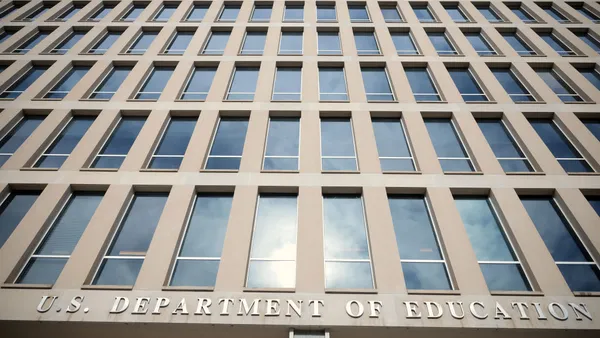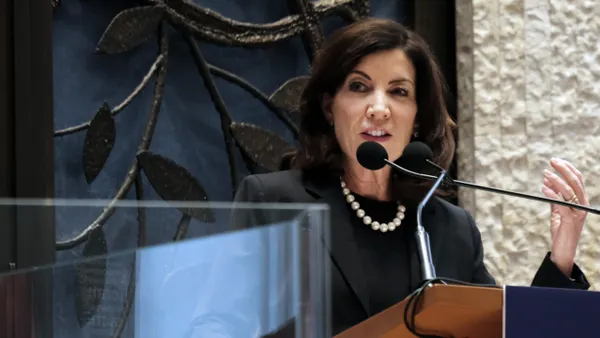Colleges could lose access to federal financial aid or face penalties if their external service providers mislead their students, the U.S. Department of Education said Tuesday.
That includes companies that help colleges launch and run online programs. Employees of online program managers, or OPMs, cannot represent themselves as working directly for colleges, including by having email addresses or signatures implying they’re employed by those institutions, according to the guidance.
OPM employees are also not allowed to represent a virtual program as equivalent to a college’s campus-based version if they have dissimilar admissions criteria, completion rates, faculty qualifications or other substantive differences. And workers in recruiting or sales roles can’t call themselves an “academic counselor” or use a similar title if it doesn’t accurately describe their position.
The guidance — issued in the waning days of the Biden administration — aims to add more oversight to colleges’ relationships with OPMs. Student advocacy groups have long called for stricter rules for these companies, which often help colleges launch online programs in exchange for a significant cut of their tuition revenue.
Carolyn Fast, director of higher education policy at The Century Foundation, a left-leaning think tank, praised the letter Wednesday.
“Today’s move by the Department of Education is a step in the right direction, affirming what we already know: OPMs commonly mislead students about the quality of their online programs and that is illegal,” Fast said in a statement. “This action will deter misconduct by OPMs and their college partners and will help protect online college students from the risks posed by predatory OPMs.”
What led to the guidance?
The guidance comes after the Biden administration’s other plans to add oversight to the OPM industry faltered.
In early 2023, the administration said it would review guidance that allows colleges to enter tuition-sharing deals with OPMs that provide recruiting help — so long as it is part of a larger bundle of services. Despite asking for public comment on the matter, the Education Department has not updated or rescinded the 2011 guidance.
At the same time it announced the review, the administration issued separate guidance that would designate OPMs and other organizations as third-party servicers. The change would have subjected them to regulations that would give the department insight into their contracts with colleges.
However, the Education Department quickly delayed the guidance — and eventually rescinded it altogether — amid widespread criticism that it would create burdensome requirements for the higher education sector.
“We finally have clarity, in the last days of the administration, what they're actually going to do with the guidance around [third-party servicers]” and OPMs, said Phil Hill, an ed tech consultant. “It's just been this soap opera for 2 1/2 years now.”
However, Hill described Tuesday’s guidance as “petulant rulemaking” from the Biden administration.
“This Dear Colleague letter is attempting to go down to the level of telling colleges and universities and vendors what words are allowable and what aren't,” Hill said. “And this went through zero process, zero attempt to get input from schools.”
That includes whether the guidance will hamstring colleges from running online programs or whether the policies address the issues they’re trying to solve, Hill said.
Stephanie Hall, senior director for higher education policy at the Center for American Progress, a left-leaning think tank, took a different stance.
The Education Department received a “treasure trove of comments” when it sought public input in 2023 on policies that would have impacted the OPM sector, Hall argued.
“A lot was given over the past couple of years, and I see this guidance letter as just an extension or a conclusion of that process and not something new that didn't take any input,” Hall said.
Whether the Trump administration will enforce the new guidance is another matter. But Hall said the guidance is likely to create changes either way.
“Schools are put on notice,” Hall said. “It’s something they take very seriously.”
The incoming Trump administration could also rescind the guidance altogether, though it’s unclear if OPM oversight is a priority issue to incoming officials.
“Are they aware of the impact this could have on online education, and is this going to be on their radars to take action and just immediately get rid of it?” Hill said.
The guidance could also draw legal challenges. The Biden administration’s now-rescinded 2023 guidance sparked a lawsuit from 2U, a prominent OPM.
“This is just waiting for a rescission or a lawsuit,” he said.
What’s in the guidance?
In Tuesday’s guidance, the Education Department listed several examples of statements that OPM employees could make that would likely qualify as misrepresentations. That includes OPM employees using email addresses or signatures that suggest they are directly employed by their college clients.
At least one prominent OPM has caught flak for using college email addresses — 2U. In 2022, The Wall Street Journal reported that the company used the “.edu” email addresses of its college clients in order to recruit prospective students into their online programs.
Hall noted that this is a widespread practice in the OPM industry.
“It's wonderful that they're addressing that and making it clear that that could be a substantial misrepresentation, and that schools would be held responsible for that,” she said.
A 2U spokesperson said that the company’s marketing and recruitment teams use university email addresses to reach out to prospective students and include transparent disclosures about their affiliation with the company.
2U is reviewing the Education Department’s letter to ensure the company remains aligned “with evolving regulatory guidance and best practices,” it said in a Thursday statement.
“Transparency has always been at the heart of our mission, and we remain steadfast in upholding this principle as we partner with universities to deliver transformative outcomes through high-quality online education,” 2U said.
Under the department's new guidance, it could also be misleading for OPM recruiters or sales representatives to present themselves to students as academic counselors or other similar positions.
“Such practices create a high risk of misrepresentation since rewarding an individual based on sales indicates that individual’s role is not focused on impartially counseling prospective or enrolled students, but rather on securing a financial transaction,” the Education Department said.
The overall guidance focuses on disclosures to students, Hall said.
“The biggest change is really just disclosures, disclosures that are going to be coming from the contractor and overseen by the institution,” she said. “I don't see this mocking the core of the actual online program itself, or its operations or its business model.”
The agency also warned against OPMs casting online programs as equivalent to their campus-based counterparts if they provide “distinct and substantively different” resources to students, including instructors, curricula and advisers.
In a footnote, the guidance cites a class-action lawsuit against the University of Southern California, which alleged that the institution presented its online master’s degree in social work as the same as a campus-based one, even though it outsourced “substantial aspects” of the virtual version to 2U.
2U was not named as a defendant in the case.
The company’s college partners retain full control over core functions of their degree programs, including tuition rates, faculty hiring, and admissions standards and decisions, a 2U spokesperson said. 2U’s clients also review and approve marketing materials for their programs, the spokesperson said.
The lawsuit is ongoing.
However, USC and 2U announced in late 2023 plans to wind down their partnership on most of their online programs, including the social work master’s degree. 2U continues to support a USC physical therapy program.
Project on Predatory Student Lending is helping represent the students in the lawsuit against the University of Southern California. In a statement Thursday, PPSL President and Executive Director Eileen Connor said she hoped the Trump administration would take the letter’s concerns seriously.
“This letter calls out just how dangerous the OPM industry is to our higher education system,” Connor said.












